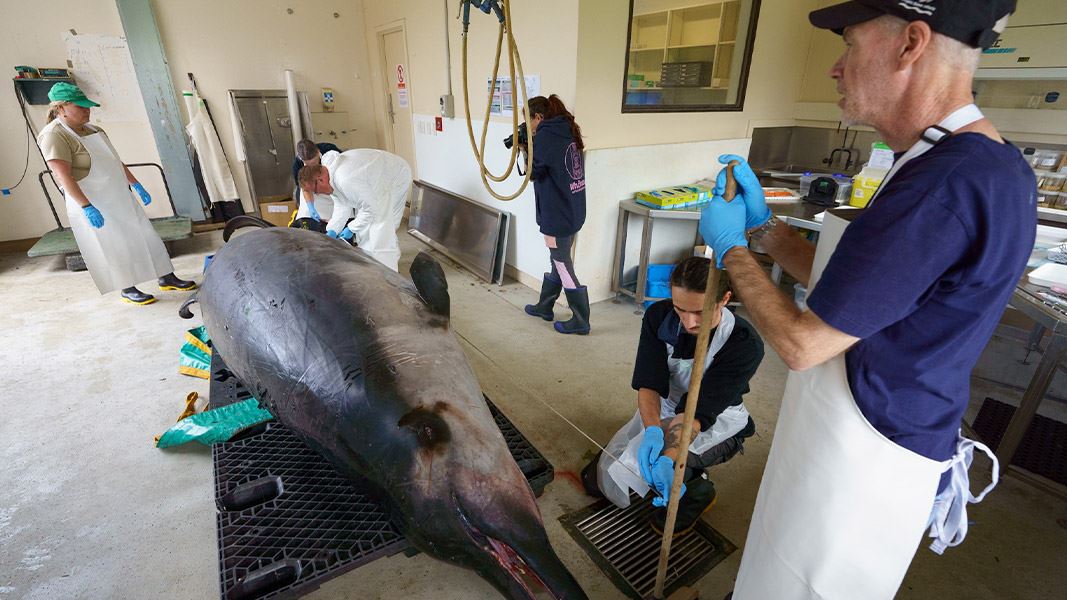Archived content: This media release was accurate on the date of publication.
Date: 02 December 2024 Source: Te Rūnanga o Ōtākou, Te Papa Atawhai Department of Conservation, Tūhura Otago Museum, Ōtākou Whakaihu Waka University of Otago
The 5-metre-long male spade-toothed whale that washed ashore at Otago’s Taiari Mouth in July will undergo dissection at Invermay Agresearch Centre in Mosgiel for a week from Monday.
Next to nothing is known about the species. Since the 1800s, only 6 other spade-toothed whales have been documented worldwide, and all but one was discovered in Aotearoa New Zealand. This is the first time a complete specimen has been recovered in good condition for examination.
The extraordinary opportunity to examine the mysterious tohorā (whale) will be led by Te Rūnanga o Ōtākou in partnership with Te Papa Atawhai Department of Conservation (DOC), working with Tūhura Otago Museum and Ōtākou Whakaihu Waka University of Otago.
Te Rūnanga o Ōtākou chair Nadia Wesley-Smith says the opportunity to research the tohorā is a significant occurrence for mana whenua.
“The tohorā allows mana whenua to reconnect and apply indigenous knowledge and traditional cultural practices that have been passed down from generation to generation,” she says.
“The hapū of Te Rūnanga o Ōtākou will officially welcome the research team to our Marae in Ōtākou and teach them our customary protocols. In return, they have offered to invite our rakatahi (young people) who work in the taiao (environment) space to teach them about whale dissection.”
“We will also host Hori Parata from Ngāti Wai to share some of his extensive mātauraka (knowledge) on the tohorā with our whānau and scientists.”
A research team made of up international and local scientists will be led by DOC Senior Marine Science Advisor and beaked whale expert Anton van Helden. Scientists from DOC, Tūhura Otago Museum, and Ōtākou Whakaihu Waka University of Otago will be joined by three international marine biologists from the USA: Dr Joy S. Reidenberg, Dr Michael Denk, and Dr Alexander Werth.
Mr van Helden says the dissection will provide baseline information about the species.
“Beaked whales are the most enigmatic group of large mammals on the planet, they are deep divers that are rarely seen at sea, which presents real challenges for researching these marine animals. Most of what we know about these elusive whales comes from the examination of whales that have come ashore and died. This one is the rarest of the rare, only the seventh specimen known from anywhere in the world, and the first opportunity we have had to undertake a dissection like this,” he says.
“We will be able to look at the structures used for sound production, its stomach layout, that is unique to each species of beaked whale, even down to confirming exactly how many vertebrae this species has."
Tūhura will host a panel discussion with representatives from Te Rūnanga o Ōtākou and the research team to discuss the groundbreaking discoveries from the first-ever dissection and the cultural connections and tikaka surrounding the tohorā on Thursday 5 December at 5:30 pm at Tūhura Otago Museum.
The findings of the dissection may have implications for how we manage the human threats these species face in their environment, Mr van Helden says.
“This is a remarkable and globally significant opportunity.”
Following the dissection, Te Rūnanga o Ōtākou has given permission to Tūhura to retain the skeleton but will hold the kauae (jawbone) for cultural purposes. A 3D print will be made of the jaw for presentation purposes by the museum.
Dissection will run from Monday 2 December through to Friday 6 December 2024.
Contact
For media enquiries contact:
Email: media@doc.govt.nz
